The Ecosystem Project: Part three
The SPN Ecosystem Project
The SPN Ecosystem Project is a multimedia series tracing key players, startups and events that have shaped Nebraska’s entrepreneurial landscape since the early 2000s. The series blends SPN’s archival content with new reporting to explore how the ecosystem has evolved and the individuals who helped build it.
This installment spotlights Karen Borchert, founder and CEO at Alpaca. This article is a multimedia piece that includes videos, archived photos, links to past articles and drop-down boxes.
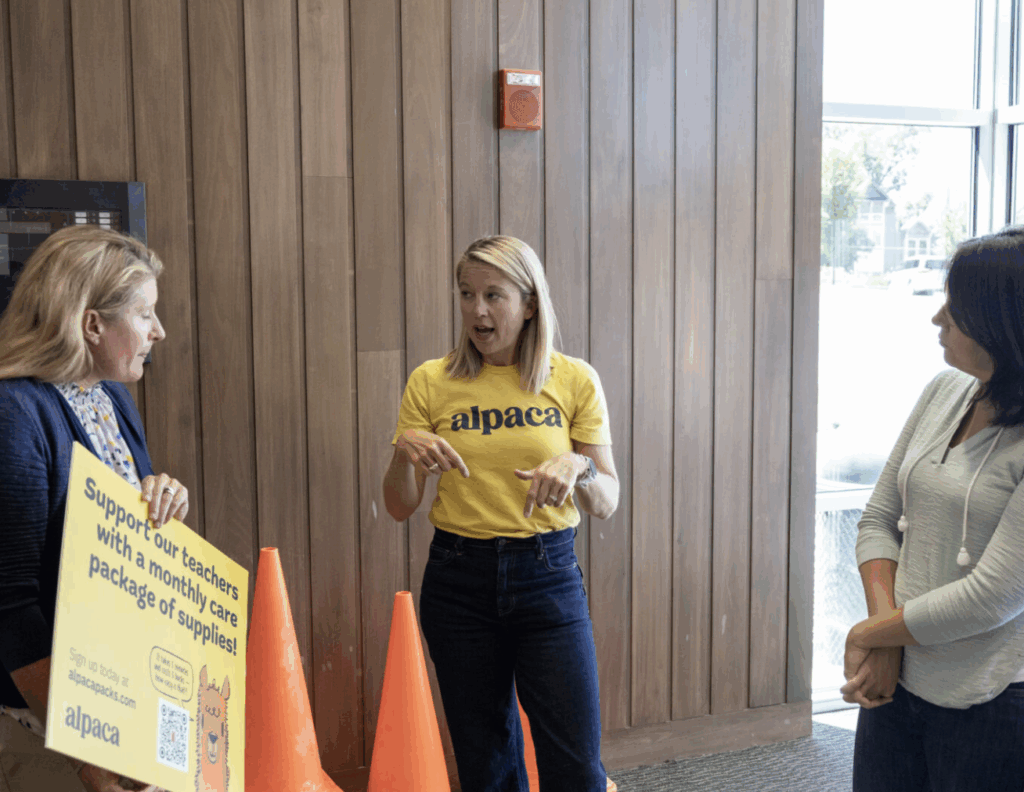
In 2021, Karen Borchert began visiting teachers after school, often bringing coffee and asking a simple question: What would make your day easier?
Those conversations marked the beginning of Alpaca, an Omaha-based education startup redefining how schools recognize and retain teachers. What started as a few care packages assembled in a small office has grown into a platform serving more than 100 schools and districts across the country.
“We make it easy to support teachers,” Borchert said. “And that’s kind of what it comes down to.”
Founded in 2022, Alpaca launched with celebratory “Alpaca Packs” filled with classroom supplies, thank-you notes and small treats. Today, the company pairs those packs with data-driven engagement tools, a growing resource library and programs designed around one goal: making schools the happiest places to work.
From English teacher dreams to startup CEO
Borchert didn’t plan to become a tech founder. Trained as an English teacher, she spent much of her career in nonprofit leadership and tech operations before returning to her passion for education.
“I have always had a really strong passion for teachers and for the profession of education overall,” Borchert said. “I’m passionate about what educators can do as a profession in the world.”

After earning a degree in secondary education, Borchert moved away from Nebraska to pursue nonprofit leadership roles. She eventually transitioned into the startup world, co-founding Keen Guides in 2008, a GPS-based mobile app that provided multimedia tours for museums and cultural institutions.
The venture was ahead of its time — and ultimately failed. The reason, Borchert later wrote in a 2016 SPN guest post, was simple: they weren’t selling.
From the SPN archives: If you’re not selling, you’re not a startup
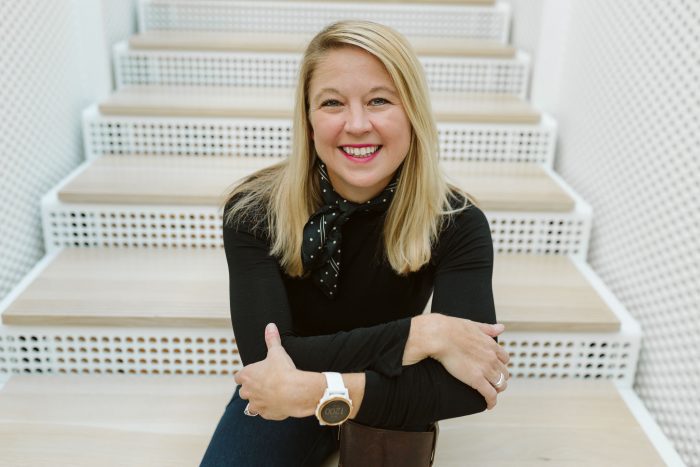
“We got a little distracted with being a startup,” she wrote. “We did a lot of cool startup stuff… We networked, we had meetings, we drank coffee, we got a cool office space, we made T-shirts and then we had some more meetings. We failed for exactly one reason: We weren’t selling. We got lost in the ‘gear’ of the startup life, and forgot to get some damn customers. And we lost the race because of it.”
After Keen Guides, Borchert returned to Nebraska and joined Flywheel in 2016 as chief operating officer. Flywheel, a WordPress managed hosting company founded in Omaha by Dusty Davidson, Rick Knudtson and Tony Noecker, was in hypergrowth mode at the time.
Read more about Flywheel in the second story of the Ecosystem Project.
During her tenure, Borchert helped scale the company from dozens of employees to hundreds, navigating the challenges of hiring, culture and scarcity in a small market.
“If you’re building a company in San Francisco, Boston or Austin, there is an abundance of everything — people, companies, investor dollars, peers. Building a company in these places is competitive, sure, but the resources you need to do it are abundant. Building a company in Nebraska is a different story.”
Borchert in her 2020 SPN blog post
“In true Midwestern form, we are grateful for the scarcity and motivated by the hardship,” Borchert wrote in a 2020 blog post reflecting on her time at Flywheel. “At Flywheel, we took an unorthodox approach to this scarcity. We did not distract ourselves with raising enough money to pay for perfect pedigrees, nor did we settle for team members that we didn’t believe could take us to the moon. Instead, we invested in the potential of people, rather than on their value today.”
From the SPN archives: Karen Borchert on Flywheel: Building something big, in the middle of somewhere small
Those lessons in talent development and employee engagement proved critical when she launched Alpaca.
The spark: Why Alpaca exists
After leaving Flywheel in 2021 and spending a short period at an e-commerce company in Austin, Borchert felt a pull back to education.
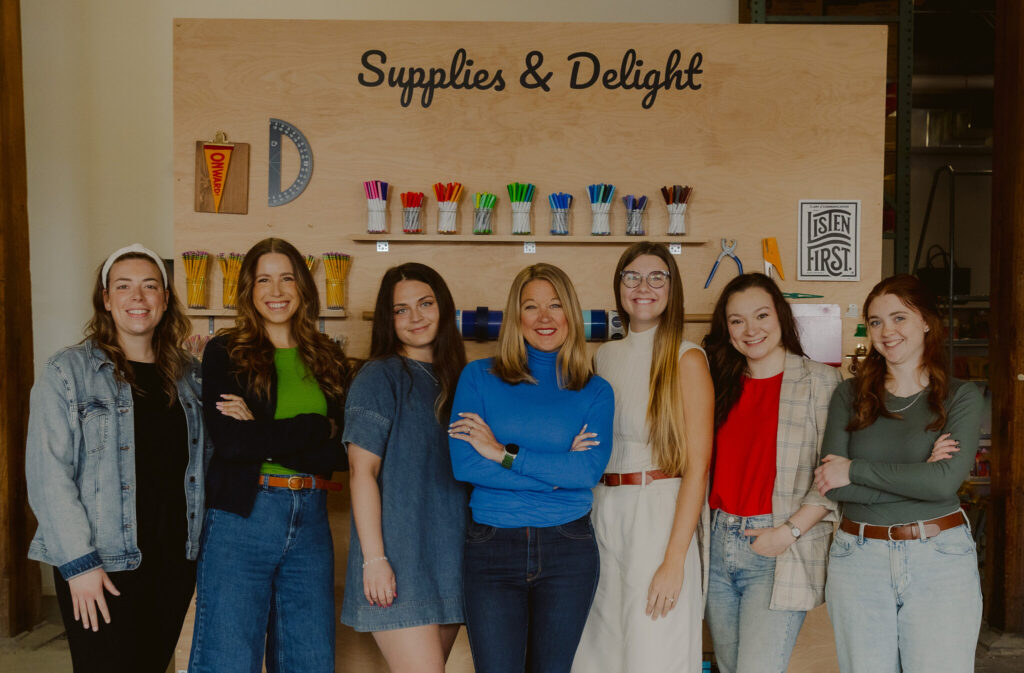
During the pandemic, she watched her kids’ teachers become increasingly stressed and underappreciated. She didn’t pretend to understand every challenge educators faced, but she knew she wanted to help.
That determination led her back into classrooms — this time as a listener. She began visiting teachers after school, often bringing coffee and asking what would make their day easier.
Those conversations revealed a clear pattern: Teachers were spending their own money, often hundreds of dollars, on classroom supplies while juggling an overwhelming workload.
Borchert started wondering what small, practical steps could help teachers feel more supported without adding to their responsibilities.
The answer became Alpaca: a subscription service for schools and districts to send teachers quality supplies and recognition without creating more work.
“We’re here for the future of education, and we know it all begins with listening to the extraordinary men and women standing in the front of the classroom, out on the field with the band, in the nurses’ office, traveling across the city to multiple schools, or supporting students in the million unseen ways that educators do.”
Borchert, from her Team Letter Substack
What Alpaca does
Alpaca’s early focus on care packages tapped into a universal need: feeling recognized at work. Each Alpaca Pack included seasonal supplies and a handwritten thank-you note, a small gesture designed to make educators feel appreciated.
But every package also included something else: a QR code linking to an optional, anonymous survey. That feedback became the foundation for Alpaca Pulse, a survey tool that gives principals real-time insight into staff morale and needs.
“We may have sort of inadvertently begun to create a way for schools to listen to their teachers, learn from that and then act on that and recognize and reward their teachers,” Borchert said. “And so what if we just shifted ever so slightly to create that as value?”
She added: “Good, solid information directly from teachers about how they’re doing at work, and what would help them feel better at work. That’s a need to have right now.”
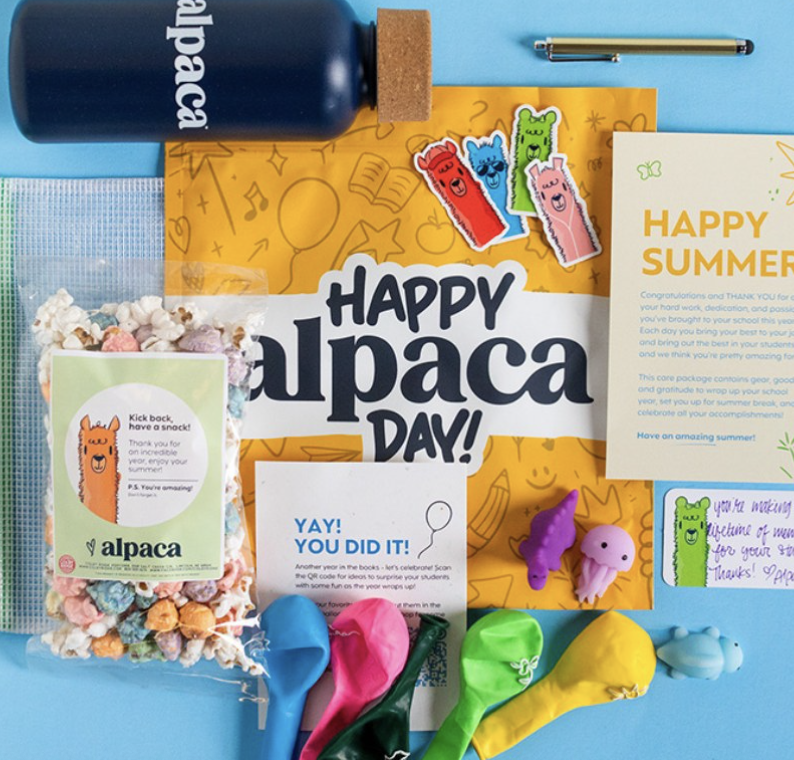


That philosophy is reflected in Alpaca’s five core values: Write thank-you notes, listen to teachers, tell stories, elevate every educator and bring out the best.
Today, Alpaca has grown beyond Omaha. Alongside Alpaca Packs and Pulse surveys, the startup offers a library of downloadable resources for school leaders, a weekly “Little Wins” newsletter and creative engagement tools like Start, Stop, Continue, adapted from corporate playbooks for education.
As of May 2024, Alpaca had shipped its 40,000th care pack. In early 2025, the company closed a $1.8 million seed round led by Nelnet and Invest Nebraska, with participation from Workshop Ventures, the Lozier Foundation and MOVE Venture Capital.
The why: A job that got bigger
Teachers’ roles have always been demanding, but the pandemic magnified those challenges — and then some.
“The overwhelming feeling I had was that the need that felt the most prevalent was just like, ‘OK, this job got so much bigger,’” Borchert said. “Imagine if any of our jobs just got 30% bigger than they used to be. What are the things that we can do to just create a little bit of support around that?”
Beyond lesson planning and grading, teachers were stocking food pantries, managing mental health crises and scrambling for basic supplies. Community engagement — once a fixture in schools — had dwindled, leaving teachers isolated.
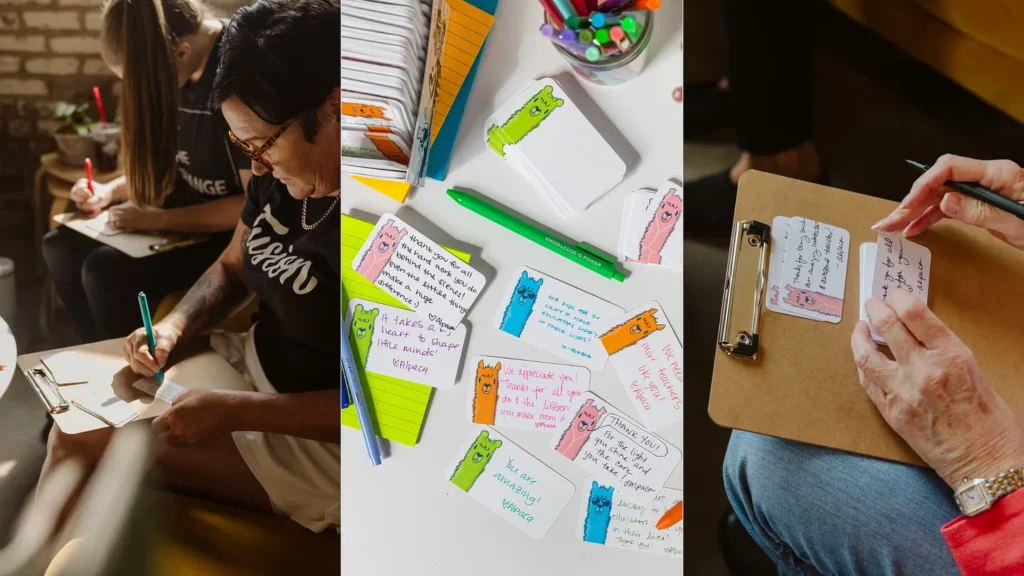
Borchert said those realities hit home when she thought about the basic logistics of the job.
“What happens when you need to go to the bathroom? You have a room full of 10-year-olds,” she said. “Never once in my entire career have I wondered, ‘Can I go to the bathroom right now?’ But teachers do.”
“You have to wonder, can you fill your water bottle, so you fill up four water bottles at the beginning of the day and keep them all on your desk, because you don’t know if you’ll have time.”
Impact in schools
Amy Anderson, principal at College View Elementary in Council Bluffs, said Alpaca has been a game changer for how her team feels about their work and how leadership responds to their needs.
“The biggest thing is … I think just being recognized, it’s a hard job,” Anderson said. “That feeling of, ‘I’m doing a good job.’ And it’s the good stuff, not cheap Post-its or off-brand markers. It’s the good stuff.”
The Council Bluffs Community School District first encountered Alpaca two years ago during a small district pilot aimed at improving teacher morale. After strong feedback from staff, the district rolled out Alpaca to all elementary schools the following year.
Teachers immediately embraced the packs, Anderson said, because they provided thoughtful, practical items such as planners, quality pens and notepads that teachers often purchase themselves on tight budgets. The gesture signaled appreciation, but it was more than that.
“(In a) public school, we don’t have extra funds to reward our teachers with things,” Anderson said. “A lot of times, that’s coming out of teachers’ pockets.”
Before Alpaca, the district relied on a single annual survey to gauge staff morale — a process Anderson said often came too late to make an impact.
“With Alpaca, staff can take surveys at any time,” Anderson said. “It gives me the pulse of the school so I can really take action right away.”
That immediacy has allowed her team to respond to issues before they escalate, whether that means adjusting professional development, carving out more planning time or introducing morale-boosting activities.
The dashboard feature showing the “positivity pulse rating” has become a regular reference point for Anderson. She said it’s less about assigning a score and more about spotting trends that allow school leaders to be proactive.
Anderson said the combination of tangible recognition and actionable feedback has shifted the tone in her building. Teachers feel heard, and leadership has better tools to demonstrate follow-through.
“My vision for our school is that through agencies of voice, choice and ownership, students and staff will succeed,” Anderson said. “That agency, that voice, is so important for people to have a say in their own success. And that’s what Alpaca gives.”
That sense of agency, she added, influences retention — a critical issue in education. While the district is still collecting long-term data, Anderson said she thinks initiatives like Alpaca have helped reduce turnover by addressing one of teachers’ top concerns: feeling valued and supported at work.
Other administrators have adopted similar approaches. Omaha’s Nelson Mandela Elementary, for example, implemented Alpaca’s Start, Stop, Continue tool for structured feedback. Teachers anonymously shared ideas on what to start doing, what to stop and what to continue. The principal shared action steps at the next meeting, creating what Borchert describes as a culture of openness.
Read more on what Alpaca means for educators
From annual to instant feedback

From care packs to culture
While Alpaca started as a recognition platform, it’s evolving into something much bigger — a driver of school culture and a hub for educator-designed innovation.
The shift became clear this summer with Camp Alpaca, a two-week paid internship that gave educators a voice in product development. Nearly 20 teachers, counselors and school leaders gathered at Luli Creative House in Omaha.
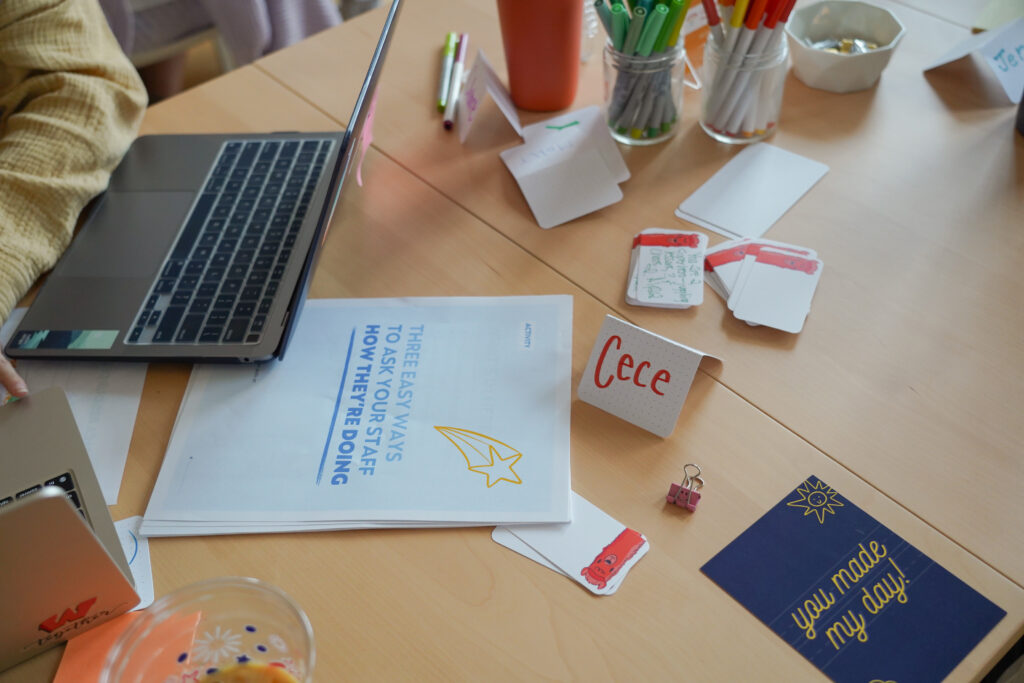
Each participant received a stipend, daily meals and full creative freedom to design tools aimed at improving school culture. By the end of camp, educators had created more than 30 new resources for Alpaca’s library, from meeting templates and gratitude exercises to toolkits for welcoming new hires.
“This is 1,000 hours of teacher input,” Borchert said. “We are absorbing and listening to the words teachers say, how they talk about work, where there’s confidence, where there’s not, what makes them feel supported and celebrated and like they belong.”
The program reflects Alpaca’s belief that teachers are not “just teachers” but highly skilled problem-solvers who deserve the same recognition and creative opportunities as professionals in any industry.

Educators described the experience as energizing and affirming. They learned design-thinking principles, explored tools like Canva, and experimented with AI-powered platforms to make classroom tasks easier. These workshops didn’t just create resources for Alpaca’s growing library; they also gave teachers new skills to take back to their schools.
“What if resources were built not by a team sitting in an office,” Borchert said, “but by a large community of educators?”
“It seems the world forgot one thing: that education, in the words of Nelson Mandela, is the most powerful weapon we can use to change the world. When the world doesn’t tell the whole story and paints you only as burned out, they forget that you, too, hold a paint brush.”
Borchert, from her Team Letter Substack
The bigger goal
Borchert is clear about Alpaca’s north star: Creating schools that educators love to work in.
“We’re an education company that doesn’t touch anything to do with students,” she said. “We are only focused on how teams that work at school feel at school, feel at work.”
That philosophy flips the traditional script for education-focused startups, which often prioritize student outcomes. For Alpaca, the premise is that happy, supported teachers create healthier schools.

Award winners: Omaha-based EdTech startup Alpaca awarded for addressing teachers’ workplace needs
The long-term vision? “Make school the happiest place to work,” Borchert said.

Alpaca’s platform now includes a growing library of downloadable guides, culture-building exercises and planning templates designed for school leaders. Topics range from improving staff meetings to creating rituals that celebrate teacher achievements, all aimed at making school a better workplace.
The company is also leaning heavily into data. Its Pulse survey platform has already generated tens of thousands of responses from teachers nationwide, giving principals real-time insight into staff morale and workplace needs. Those insights inform both Alpaca’s product development and the strategies it shares with schools.
From the SPN archive: Five Things: Karen Borchert at Millwork Conversations
Why this matters for Nebraska
Alpaca’s growth illustrates two truths about the Nebraska startup ecosystem. Mission-driven companies can thrive here, and scarcity can fuel creativity.
Borchert often points out that building in Nebraska comes with challenges, from limited capital to smaller talent pools. But, she said in her 2020 SPN essay, “scarcity can be the very thing that creates abundance, opportunity and market differentiation.”
For Borchert, who once thought she had to leave Nebraska “to do something big,” Alpaca proves otherwise.
“When you take a chance on some place small, some place with not as much, and you think about it in a different light, big things can happen,” she said.
That message resonates across the state’s innovation economy. In recent years, Omaha and Lincoln have seen an influx of startups addressing problems in education, health care and logistics — sectors deeply tied to community needs. Organizations have invested in founders who pair technical know-how with mission-driven models, betting on companies like Alpaca to set a precedent for scalable impact.

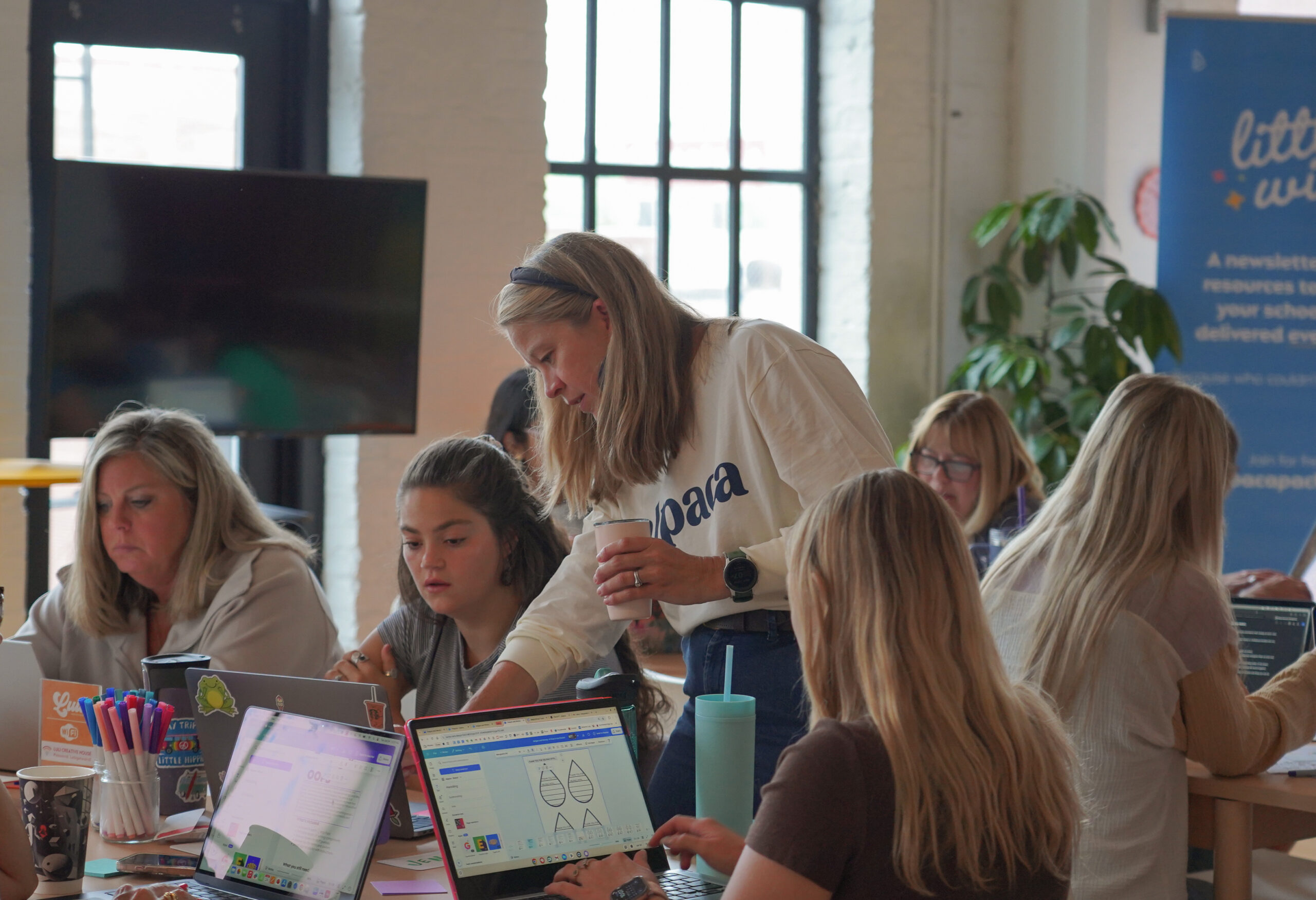


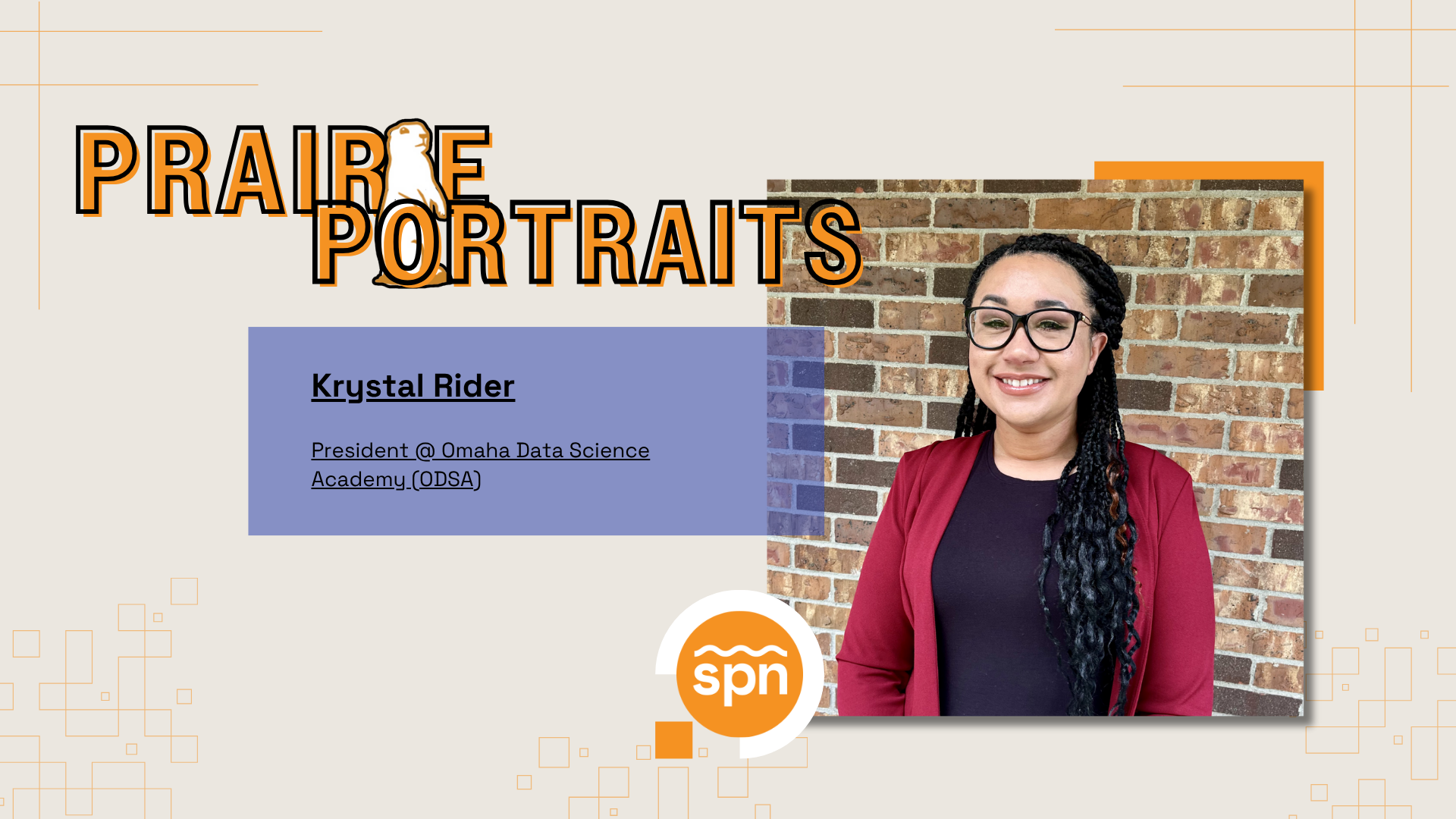
Leave a Reply